Aluminium vs Stainless Steel: Which is Better for Metal Fabrication
Metal fabrication is an essential part of many industries, ranging from aerospace and automotive to construction and marine. When it comes to choosing the right metal for fabrication, two popular choices are aluminium and stainless steel. Both metals have their unique advantages and disadvantages, making the choice between them dependent on specific applications and requirements. In this blog, we will compare the properties, advantages, and disadvantages of aluminium and stainless steel for metal fabrication.
Properties of Aluminium and Stainless Steel
Aluminium is a lightweight metal with a density of 2.7 g/cm3, making it three times lighter than steel. It has good corrosion resistance, especially when exposed to air, but can corrode in acidic or alkaline environments. Aluminium is also a good conductor of heat and electricity, making it ideal for heat exchangers, electrical components, and automotive parts.
Stainless steel, on the other hand, is an alloy of iron, chromium, and other elements, such as nickel and molybdenum. It is denser than aluminium, with a density of 7.8 g/cm3. Stainless steel has excellent corrosion resistance, even in harsh environments, and is highly durable and resistant to scratches and dents. It is also a good conductor of heat and electricity, making it suitable for a wide range of applications.
Advantages of Aluminium
One of the main advantages of aluminium is its lightweight, making it easy to handle and transport. This property also makes it an ideal material for applications that require low weight, such as aerospace, automotive, and marine industries. Aluminium is also highly recyclable, with nearly 75% of all aluminium produced still in use today.
Aluminium is also a good conductor of heat and electricity, making it an ideal material for heat sinks, radiators, and electrical components. Additionally, it is highly resistant to corrosion, making it a popular choice for outdoor applications, such as window frames and cladding.
Advantages of Stainless Steel
Stainless steel has excellent corrosion resistance, even in harsh environments, making it an ideal material for applications that require high durability and longevity. It is also highly durable and resistant to scratches and dents, making it ideal for heavy-duty applications, such as construction, automotive, and marine industries.
Stainless steel is also highly customizable, with a range of finishes and textures available, making it ideal for decorative and architectural applications. It is also a popular material for medical and food processing industries due to its hygienic properties.
Disadvantages of Aluminium
One of the main disadvantages of aluminium is its low strength compared to steel, making it less suitable for heavy-duty applications. Additionally, aluminium can corrode in acidic or alkaline environments, making it unsuitable for certain applications.
Aluminium is also more prone to thermal expansion than steel, which can cause it to warp or distort when exposed to heat. This property makes it unsuitable for high-temperature applications, such as engine components or exhaust systems.
Disadvantages of Stainless Steel
The main disadvantage of stainless steel is its relatively high cost compared to other metals, such as aluminium. Additionally, stainless steel is denser than aluminium, making it heavier and more challenging to handle and transport.
Stainless steel can also be difficult to work with, requiring specialized equipment and expertise to cut, shape, and weld. This property can make it more challenging to find skilled fabricators and increase fabrication costs.
When choosing a stainless steel fabricator or aluminium fabrication companies in Abu Dhabi, it is essential to consider factors such as experience, expertise, quality of work, and pricing. Look for a company that has experience working with your specific metal fabrication needs and has a track record of delivering high-quality work on time and within budget. Additionally, ensure that the company uses state-of-the-art equipment and employs skilled professionals to ensure that the fabrication process is efficient and accurate.
Conclusion
In conclusion, choosing between aluminium and stainless steel for metal fabrication depends on specific applications and requirements. Aluminium is ideal for applications that require lightweight, good heat conductivity, and corrosion resistance, while stainless steel is suitable for applications that require high durability, longevity, and resistance to harsh environments. Stainless steel fabricators in Abu Dhabi provide a range of metal fabrication services, making it essential to choose a company that has the expertise and experience to deliver high-quality work.

